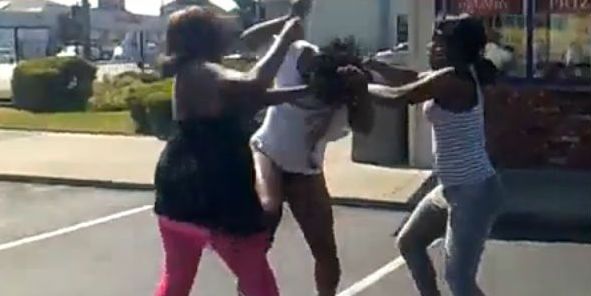Black Girl Hate: Struggling For Sisterhood

I did not discover the transformative power of sisterhood until I entered college. There I found a group of Black women in whom I could confide and depend. Knowing them centered me in my own womanhood. I saw myself in their gorgeous reflections and their radiant power. They were smart, funny, and fly. I was because they were. My sisters. My soulmates.
These women opened up my heart with love like I’d never known. Slowly, steadily I felt my core shift. We could laugh and cry together as we compared emotional scars left from the common trials of black girlhood. After spending my adolescence grasping at validation, I began to feel warm and worthy.
These spirit connections didn’t erase memories of the coldness I’d received from the Black girls who couldn’t relate to my unabashed bourgeois aspirations when I was a kid, but I wasn’t arrested by my past interactions. I now knew how amazing black women were in their essence, and that is what I held on to.
Unity is the answer. We are, however, fighting an uphill battle. When I hear women, mature and young, say “women can’t be trusted” or “I don’t have girlfriends,” I offer my testimony of restorative sisterhood. The detractors always counter with stories of betrayal and deception. I learned that these sentiments are forged beyond ubiquitous anti-woman messaging. Women who hate women are speaking out of hurt and frustration.
Recently I have been reminded of the complex and often fraught nature of Black women’s relationships. Thousands of miles away from the women I consider the loves of my life, I befriended a new group. Without trepidation, I threw myself into forging bonds with transparency and love, and they welcomed me. Because I had experienced such genuine camaraderie and caring, I assumed that is what I would always receive as long as I projected the same. My naivete shone clearly.
A male friend, whom I trust, informed me of the night they talked about me viciously as soon as I left the room. These adult women tore me down. One even commented that I wasn’t pretty enough to be in the circle. I hadn’t cried that hard in years.
Had I not already found the beauty of sister-friends, I might have dismissed black women entirely. I could not, however, because sistas have been my most ardent supporters. They have protected, inspired and guided me, but they have also wounded me. No one can hurt you quite like a woman whose reflection so closely resembles your own. It seems as though Black women know precisely how to attack each other fatally. A white girl never made me cry.
That heartbreak helped me understand why some of us are so quick to pounce on one another. We jump to avoid getting jumped and harden our hearts as hostility becomes the status quo.
In Black Looks “Revolutionary Black Women,” bell hooks interrogates why Black women seem to address each other with physical and emotional violence so often. hooks writes, “Among black women, such deeply internalized pain and self-rejection informs the aggression inflicted on the mirror image.”
As hooks notes, emotional violence is often an expression of self-loathing. A self-loathing grown from the mistaken belief that we are worthless and disposable. It’s not unusual to see Black women fighting where there are no prizes. Nowhere do we see better examples of women clawing to the bottom than on reality television, where women value themselves so little that they will happily tear each other down for whatever remnants of fame, love, or dignity they can scrounge.
On screen conflict may be magnified, but we encounter Black Girl Hate everyday. It is the nastiness women direct at each other without remorse. It’s impossible to dodge every dart, but we must remind ourselves that we are worthy simply because we exist. We are precious because we’re still here.
Releasing lingering resentment feels like surrender, but I will continue to love boldly and wish peace upon the wounded women and those who do the wounding. I have to. Openness and forgiveness mends broken hearts, and we all need a healing.
Kimberly Foster is the Founder and Editor of For Harriet. Email or Tweet her.

No comments: